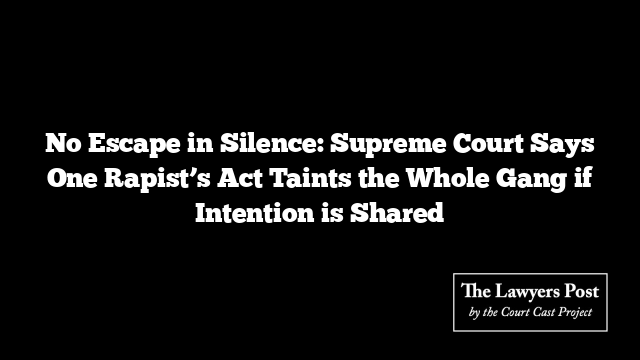In a ruling that draws a hard line against collective violence, the Supreme Court has reaffirmed that when a group of men act with a shared intention to sexually assault a woman, the law does not require each one of them to physically penetrate her for all to be held guilty of gang rape.
The judgment came in a grim case from Madhya Pradesh, where a woman was abducted in 2004 while returning from a wedding, and later raped and confined at multiple locations. Two men were convicted—Raju and Jalandhar Kol—but only one had his conviction contested all the way to the apex court.
A Bench of Justices Sanjay Karol and KV Viswanathan minced no words: “If a group moves as one with a common intention to commit gang rape, then the act of one is the act of all. Section 376(2)(g) of the IPC embeds this very principle. Consent does not multiply just because perpetrators do.”
Raju argued that the FIR had only named Jalandhar as the rapist and downplayed his own role. The Court was unpersuaded. Not only did the survivor explicitly name both men during trial, but Raju’s active participation in abducting and confining the woman cemented his role as a co-perpetrator. Whether or not penetration was proved on his part, he shared the criminal purpose—and that was enough.
The Court leaned on precedent, especially the 1989 Pramod Mahto case, to underscore that gang rape is a crime of shared execution. The law, it said, was designed to address the very nature of such assaults—where multiple attackers act together, and a woman is rendered helpless by collective threat, not just individual violation.
In this particular case, thirteen witnesses were examined, including the survivor and her father. The trial court convicted both men. Raju got life imprisonment; Kol received ten years. When the High Court upheld the verdict, Raju turned to the Supreme Court. Kol did not appeal.
Though the Court rejected Raju’s plea to overturn his gang rape conviction, it did offer some reprieve. It dropped his conviction under the SC/ST Act, finding no evidence that caste identity was a motivating factor behind the crime—a critical distinction, the Bench said, relying on the precedent set in Patan Jamal Vali v. State of Andhra Pradesh.
On another front, the Court issued a stern rebuke over the continued use of the discredited two-finger test in medical examinations of rape survivors, calling it “inhuman and degrading.” It reminded lower courts and medical professionals alike that a woman’s sexual history has no bearing on her credibility. “It is patriarchal and sexist to presume that sexual activity invalidates her account,” the judges observed.
Despite minor inconsistencies in the survivor’s various statements—a common occurrence in trauma cases—the Court found her testimony “clinching,” consistent, and credible.
Recognizing that the co-accused had received a lesser sentence, the Bench ultimately reduced Raju’s punishment from life imprisonment to ten years of rigorous imprisonment. His convictions for kidnapping, wrongful confinement, and gang rape under the IPC, however, remain untouched.
In one sentence, the ruling delivers a message that resonates well beyond the courtroom: when it comes to gang rape, silence, inaction, or peripheral involvement will not serve as a shield. Where the intent is shared, the guilt is mutual.





